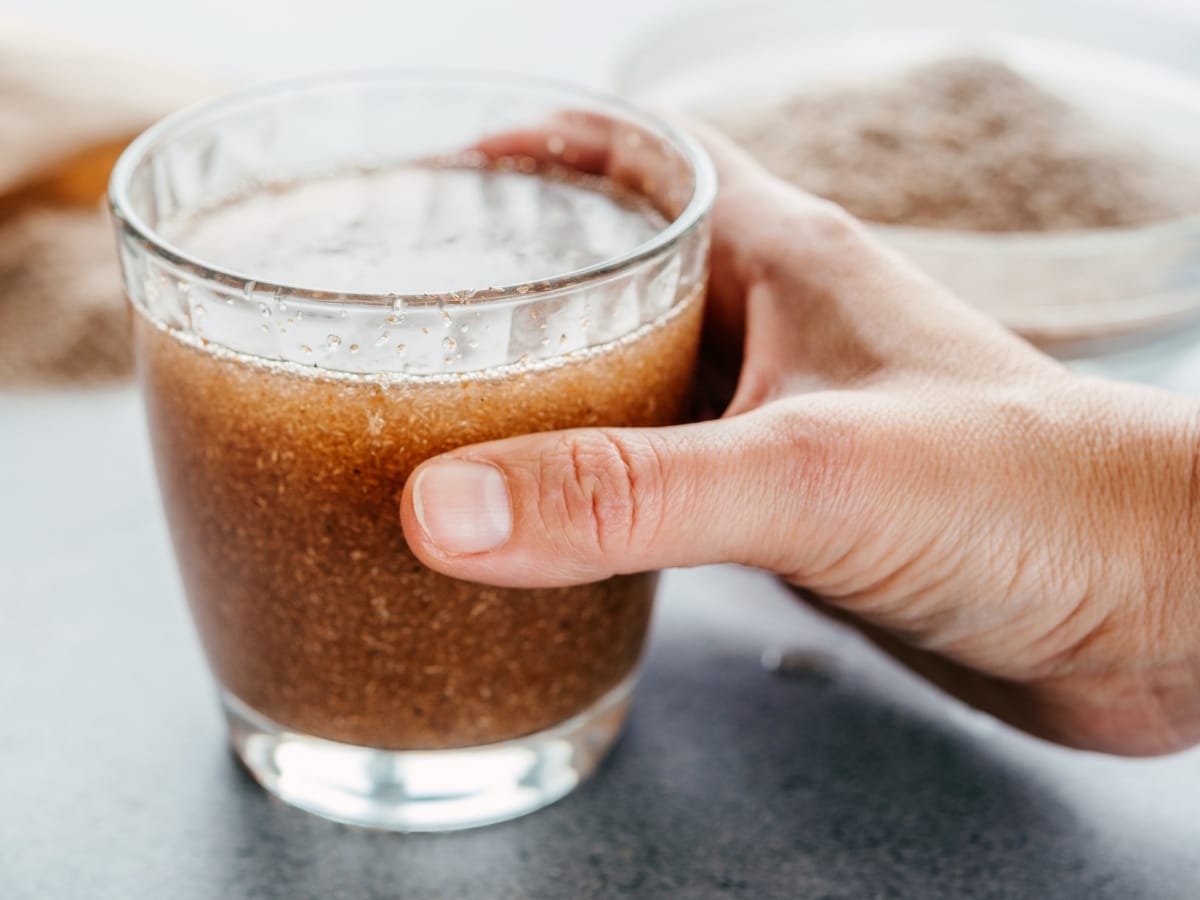How To Use Psyllium Husk: Recommended Dosage And Administration
Psyllium husk is a common dietary supplement that can help you increase your fiber intake and manage mild side effects from GLP-1 weight loss medication. In this guide, we explain what psyllium husk is and how you should take it to get maximum health benefits.

Psyllium husk is a common dietary supplement that can help you increase your fiber intake and manage mild side effects from GLP-1 weight loss medication, such as constipation and diarrhea. In this guide, we explain what psyllium husk is and how you should take it to get maximum health benefits.
What is psyllium husk?
Psyllium husk, or ispaghula husk, is a fiber supplement made by grinding the outer layer of psyllium seeds from Plantago ovata, a medicinal plant grown in India. [1, 2]. It's a soluble fiber, a type of dietary fiber that isn't absorbed or broken down in your small intestine. Instead, it absorbs water to form psyllium gel, which is a thick, viscous gel that acts as a bulk-forming laxative — a type of laxative that increases the bulk of stools, which helps stimulate regular bowel movements. [3]
What are the benefits of psyllium husk?
Using psyllium husk products is proven to have a number of health benefits, and it's often prescribed to ease symptoms of irritable bowel syndrome, chronic constipation and other health conditions. Here are some of the effects of psyllium:
Relieving constipation
Psyllium helps bind partially digested food and water to increase the volume and moisture level of stools. This makes them easier to pass and helps encourage regular bowel movements. [4]
Treating diarrhoea
Psyllium can also help treat diarrhea. It helps you form loose stools and slows their passage through your digestive tract. [4]
Helping you feel full
Consuming soluble fibers like psyllium husk can increase satiety because they're digested slowly, so they sit in your stomach for longer and help you feel full. [5] A study found that taking psyllium before breakfast and lunch can reduce hunger between meals. [6]
Regulating blood sugar
Soluble fibers can help control your blood sugar levels by slowing the absorption of glucose into your bloodstream. [7, 8]
Supporting heart health
Eating dietary fiber can reduce your risk of heart disease and stroke, and also help improve your blood pressure levels. [9, 10]
Can psyllium husk help you lose weight?
Some people claim psyllium husk powder is an alternative to GLP-1 medications such as Compounded Semaglutide, Mounjaro and Wegovy, which can help you lose weight. [11, 12] While fiber supplements can help you feel full, reduce hunger and control blood glucose levels, GLP-1s mimic a naturally occurring hormone in your body. This allows GLP-1s to target hunger receptors, regulate insulin release and slow digestion, making them more effective than psyllium at aiding weight loss. [7, 13]
However, taking fiber supplements like psyllium husk or increasing your dietary fiber intake can help you manage gastrointestinal side effects of GLP-1s, like constipation and diarrhea.
How to take psyllium husk
Psyllium husk comes in many forms, including: powder, capsules, wafers, granules and liquid. You should follow the directions on the packaging of your psyllium supplement, and speak to your doctor or pharmacist if you have any questions.
Current guidelines for daily fiber intake vary by age and gender:
- For women: If you’re under 50 you should aim for 25-28 g/day, and if you’re over 50, 21-22 g/day.
- For men: If you’re under 50 you should aim for 31-38 g/day, and if you’re over 50, 28-30 g/day.
The amount of psyllium husk needed to reach your daily fiber goals will depend on your current fiber intake. Depending on the type of psyllium husk you purchase, you may need multiple doses per day to reach your daily fiber target. However, it’s important to note that psyllium husk should not be used as your only source of fiber — we recommend you follow a balanced diet with a variety of fiber sources.
Typical dosages range from 5 to 15 grams, which can be taken up to three times a day. These doses are generally well-tolerated — this means clinical studies show they're safe and have few adverse effects. [14, 15] We recommend starting with a smaller dose of psyllium husk to minimise the risk of potential side effects, like stomach pain and bloating.
Powder and granule forms of psyllium husk should be mixed with at least 8 oz / 240 ml of pleasant-tasting liquid like fruit juice before you take it. It's extremely important that you drink plenty of water (at least 8 oz / 240 ml of liquid) with psyllium husk. [16] As psyllium absorbs water and swells, you need to make sure there is water available in your digestive tract to reduce the risk of side effects and make your supplement effective.
Psyllium husk wafers or capsules should be taken with a large glass of water, at least 8 oz / 240 ml. [16]
Does psyllium husk have any side effects?
Like any medication or supplement, psyllium husk can cause some side effects. Not everyone experiences them, and most people who do only have mild symptoms. These can include stomach pain, stomach cramps and bloating. [16, 17] If your side effects are severe or don't resolve on their own, speak to your healthcare provider for advice.
Seek immediate medical attention if you have difficulty swallowing or experience signs of an allergic reaction, such as: trouble breathing or swallowing, rashes, itching, blistered skin or swelling of your mouth, face, tongue or throat.
Need support with weight loss?
A GLP-1 medication like Compounded Semaglutide could help you achieve significant weight loss results. Start a consultation today to see if you're eligible for a weight loss treatment with ZipHealth.
References:
- Semeco A. Psyllium: Benefits, safety, and dosage [Internet]. www.medicalnewstoday.com. 2020. Available from: https://www.medicalnewstoday.com/articles/318707
- Zitterman A. DIETARY FIBER | Bran. In: Caballero B, editor. Encyclopedia of Food Sciences and Nutrition (Second Edition) [Internet]. Academic Press; 2003 [cited 2024 Dec 5]. p. 1844–50. Available from: https://doi.org/10.1016/B0-12-227055-X/00346-1.%20 (https://www.sciencedirect.com/science/article/pii/B012227055X003461)
- Liu LWC. Chronic constipation: current treatment options. Canadian journal of gastroenterology = Journal canadien de gastroenterologie [Internet]. 2011 Oct;25 Suppl B(Suppl B):22B28B. Available from: https://pubmed.ncbi.nlm.nih.gov/22114754/
- Lambeau KV, McRorie JW. Fiber supplements and clinically proven health benefits. Journal of the American Association of Nurse Practitioners [Internet]. 2017 Apr [cited 2019 Dec 17];29(4):216–23. Available from: https://www.ncbi.nlm.nih.gov/pmc/articles/PMC5413815/pdf/JAAN-29-216.pdf
- Salleh SN, Fairus AAH, Zahary MN, Bhaskar Raj N, Mhd Jalil AM. Unravelling the Effects of Soluble Dietary Fibre Supplementation on Energy Intake and Perceived Satiety in Healthy Adults: Evidence from Systematic Review and Meta-Analysis of Randomised-Controlled Trials. Foods. 2019 Jan 6;8(1):15.
- Brum JM, Gibb RD, Peters JC, Mattes RD. Satiety effects of psyllium in healthy volunteers. Appetite [Internet]. 2016 Oct [cited 2019 Oct 31];105:27–36. Available from: https://www.sciencedirect.com/science/article/pii/S0195666316301738
- Abutair AS, Naser IA, Hamed AT. Soluble fibers from psyllium improve glycemic response and body weight among diabetes type 2 patients (randomized control trial). Nutrition Journal. 2016 Oct 12;15(1).
- Xiao Z, Chen H, Zhang Y, Deng H, Wang K, Bhagavathula AS, et al. The effect of psyllium consumption on weight, body mass index, lipid profile, and glucose metabolism in diabetic patients: A systematic review and dose‐response meta‐analysis of randomized controlled trials. Phytotherapy Research. 2020 Jan 9;34(6):1237–47.
- McRae MP. Dietary Fiber Is Beneficial for the Prevention of Cardiovascular Disease: An Umbrella Review of Meta-analyses. Journal of Chiropractic Medicine [Internet]. 2017 Dec;16(4):289–99. Available from: https://www.ncbi.nlm.nih.gov/pmc/articles/PMC5731843/
- Clark CCT, Salek M, Aghabagheri E, Jafarnejad S. The effect of psyllium supplementation on blood pressure: a systematic review and meta-analysis of randomized controlled trials. The Korean Journal of Internal Medicine. 2020 Nov 1;35(6):1385–99.
- Wilding JPH, Batterham RL, Calanna S. Once-Weekly Semaglutide in Adults with Overweight or Obesity. The New England Journal of Medicine. 2021 Feb 10;384(11):989–1002.
- Jastreboff AM, Aronne LJ, Ahmad NN, Wharton S, Connery L, Alves B, et al. Tirzepatide Once Weekly for the Treatment of Obesity. New England Journal of Medicine [Internet]. 2022 Jun 4;387(3). Available from: https://www.nejm.org/doi/full/10.1056/NEJMoa2206038
- Collins L, Costello RA. Glucagon-like peptide-1 receptor agonists [Internet]. PubMed. Treasure Island (FL): StatPearls Publishing; 2024. Available from: https://www.ncbi.nlm.nih.gov/books/NBK551568/
- Rodríguez-Morán M, Guerrero-Romero F, Lazcano-Burciaga G. Lipid- and glucose-lowering efficacy of Plantago Psyllium in type II diabetes. Journal of Diabetes and Its Complications [Internet]. 1998 Sep 1 [cited 2021 Aug 23];12(5):273–8. Available from: https://pubmed.ncbi.nlm.nih.gov/9747644/
- Frati-Munari AC, Fernández-Harp JA, Becerril M, Chávez-Negrete A, Bañales-Ham M. Decrease in serum lipids, glycemia and body weight by Plantago psyllium in obese and diabetic patients. Archivos de investigacion medica [Internet]. 2024 [cited 2024 Dec 5];14(3). Available from: https://pubmed.ncbi.nlm.nih.gov/6322713
- MedlinePlus. Psyllium: MedlinePlus Drug Information [Internet]. medlineplus.gov. 2024. Available from: https://medlineplus.gov/druginfo/meds/a601104.html
- Psyllium Side Effects: Common, Severe, Long Term [Internet]. Drugs.com. Available from: https://www.drugs.com/sfx/psyllium-side-effects.html
